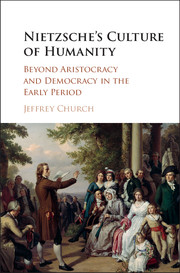Book contents
- Frontmatter
- Dedication
- Contents
- Preface
- List of abbreviations
- Introduction
- PART I The Foundation of Culture in the Early Nietzsche
- Part II Two Concepts of Culture in the Early Nietzsche
- PART III The Means to Culture in the Early Nietzsche
- 7 The Education to Culture
- 8 The State, Liberalism, and Culture
- PART IV The Significance of the Early Period
- Bibliography
- Index
8 - The State, Liberalism, and Culture
from PART III - The Means to Culture in the Early Nietzsche
Published online by Cambridge University Press: 05 October 2015
- Frontmatter
- Dedication
- Contents
- Preface
- List of abbreviations
- Introduction
- PART I The Foundation of Culture in the Early Nietzsche
- Part II Two Concepts of Culture in the Early Nietzsche
- PART III The Means to Culture in the Early Nietzsche
- 7 The Education to Culture
- 8 The State, Liberalism, and Culture
- PART IV The Significance of the Early Period
- Bibliography
- Index
Summary
In the last chapter, we saw that for the early Nietzsche, education is a crucial means for fostering culture. In this chapter, we turn to the other means Nietzsche discusses in his early works, namely, the state. Nietzsche's understanding of politics has been discussed and debated at great length in the literature. The main debate is between our two familiar camps: the “aristocratic” and “democratic” readings. However, despite the wide gap between, for instance, Frederick Appel's Nietzsche contra Democracy and Laurence Hatab's A Nietzschean Defense of Democracy, these readers actually share a broad consensus over a fundamental issue, namely, both agree that Nietzsche's own political views were a form of “neoaristocratic conservatism” (Warren (1988, 213)). Their disagreement centers on what one ought to do with Nietzsche's unquestionably aristocratic political views – are they disposable features of his thought or not?
In what follows, I do not wade into this disagreement. Rather, I challenge the fundamental consensus that Nietzsche held aristocratic political views. I argue that, instead, the early Nietzsche followed classical German thinkers such as Kant and Schiller – and more proximate influences such as Schopenhauer and Burckhardt – in defending a classical liberal view of politics. Nietzsche thought, like Schiller before him, that the modern state is not a good instrument for the advancement of culture. Its function – the physical compulsion of human bodies for the purpose of securing the material well-being of a community – makes it singularly unsuited to performing a spiritual function of cultural renewal. These views left Schiller sympathetic to the classical liberalism of Montesquieu and his constitutional monarchy. I will argue that Nietzsche develops a liberal view for the same reasons. At the same time, my interpretation of Nietzsche's liberalism contrasts sharply with the varied liberal and political skeptical readings of Nietzsche in recent years, such as Rorty's (1989) “bourgeois liberalism,” Tamsin Shaw's (2007) political skepticism, and Kaufmann's (1974) “antipolitical” account of Nietzsche. These interpretations overlook Nietzsche's positive views of the legitimate function of limited state power, which is not simply to protect individual rights, but also – in a suitably circumscribed way – to protect and transmit culture.
- Type
- Chapter
- Information
- Nietzsche's Culture of HumanityBeyond Aristocracy and Democracy in the Early Period, pp. 206 - 228Publisher: Cambridge University PressPrint publication year: 2015



